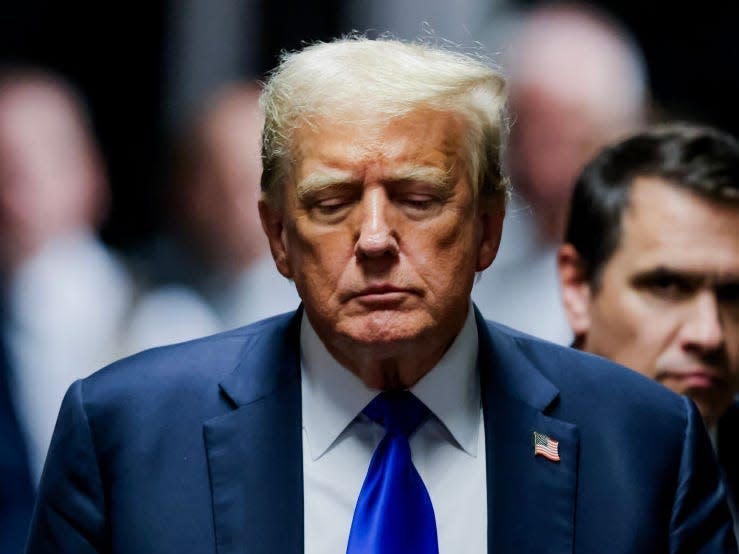Trump not testifying in his hush-money trial was a mistake, legal experts say

Trump was convicted on 34 counts of falsifying business records related to hush-money payments.
Legal experts said the defense made mistakes and that the prosecution told a better story.
Trump had previously said he would testify but ultimately didn't, which may have hurt his case.
Former President Donald Trump's historic conviction on Thursday may have been in part due to mistakes made by his defense team, including not having him take the stand, legal experts told Business Insider.
A New York jury convicted Trump on 34 counts of falsifying business records related to a hush-money payment made to porn star Stormy Daniels. The verdict made history: Trump is the only US president to also be a convicted felon.
Though the conclusion of the case was significant, three legal experts told BI the verdict wasn't a major shock. Two said Trump's team made a number of mistakes during the trial that could have influenced the jury's decision.
"I can't say I'm surprised," Alex Reinert, a criminal law and constitutional law expert at the Cardozo School of Law, said. "At the end of the day, it was a pretty simple case for the prosecution."
Mistakes were made
Eric Anderson, a former prosecutor and current counsel at Early Sullivan Wright Gizer & McRae LLP, said the case could've gone either way, but that he thought the odds favored the prosecution going into deliberations.
"Whoever has the best story wins," he told BI. "The prosecution's story was very simply: that Donald Trump did something that on its face, could have been completely legal, but he did it in an attempt to circumvent a federal election law."
On the other hand, he thought the defense's story just didn't work. For instance, they denied Trump ever had an affair with Daniels and did not provide a counter for it, even though many Americans already believe the alleged affair happened.
Neama Rahmani, a former federal prosecutor and president of West Coast Trial Lawyers, said the defense "overpromised and underdelivered."
He pointed to opening statements made by Trump's lawyer, Todd Blanche, that Rahmani thought suggested an accountant would testify and serve as a fall guy. No such testimony was offered.
He also said the defense focused too much on Michael Cohen, Trump's former lawyer, but that he wasn't even the key witness. Instead, Rahmani said it was David Pecker, the former publisher of the National Enquirer, who was the key witness for the prosecution.
"He's the one that directly tied Trump to the catch and kill scheme," he said.
Anderson said Cohen's testimony worked against Trump, despite the lawyer's potential credibility issues. He said often the most credible witnesses are the ones who own up to being liars, and that the defense just didn't know how to rattle Cohen.
Even if the defense hadn't made these mistakes, it might not have made a difference, Rahmani said. Still, he thought they made it a lot easier for the jury to find Trump guilty.
Not testifying may have hurt Trump
Whether Trump would take the stand was a will-he-won't-he question for weeks, with the former president even saying he would testify.
But when the defense's case rested last week, Trump hadn't been called to the stand.
"Donald Trump never got up there and said, 'Here's the reason I did this.' If you don't do that, all the jury is left with is the prosecution's version of events," Anderson said.
Not long before resting their case, the defense told the judge they were still weighing having Trump testify. Some legal experts previous said testifying would not be a good idea for Trump, with concerns that he could end up committing perjury.
But Rahmani agreed that not having him speak up may have ultimately hurt his case.
"The defense needed something, some sort of explanation," Rahmani said of the falsified records.
"I think they would've been better off if either Trump or an accountant testified, 'These were wrong, but it was an innocent mistake,'" he said.
Instead of claiming that a mistake was made with the records, Rahmani said the defense chose to "lie" in their closing statements and say there were no issues with the payments.
"I think they lost all credibility," he said.
Don't expect to see Trump behind bars
Trump's sentencing is scheduled for July 11. It's highly unlikely he will receive any jail time, the experts said. Instead, probation is most likely, or potentially home confinement.
"There's no way Judge Merchan is going to send him to jail. It was clear when he violated the gag order 10 times and the judge just threatened him," Rahmani said.
Trump's team will almost certainly appeal, but their potential arguments aren't particularly strong, the lawyers said.
Regardless of the sentence, Trump would still be able to run for president. Being convicted of a felony — or even being behind bars — does not disqualify presidential candidates.
Trump and Biden both said as much after the verdict, when they each emphasized the importance showing up at the ballot box in November.
Read the original article on Business Insider


